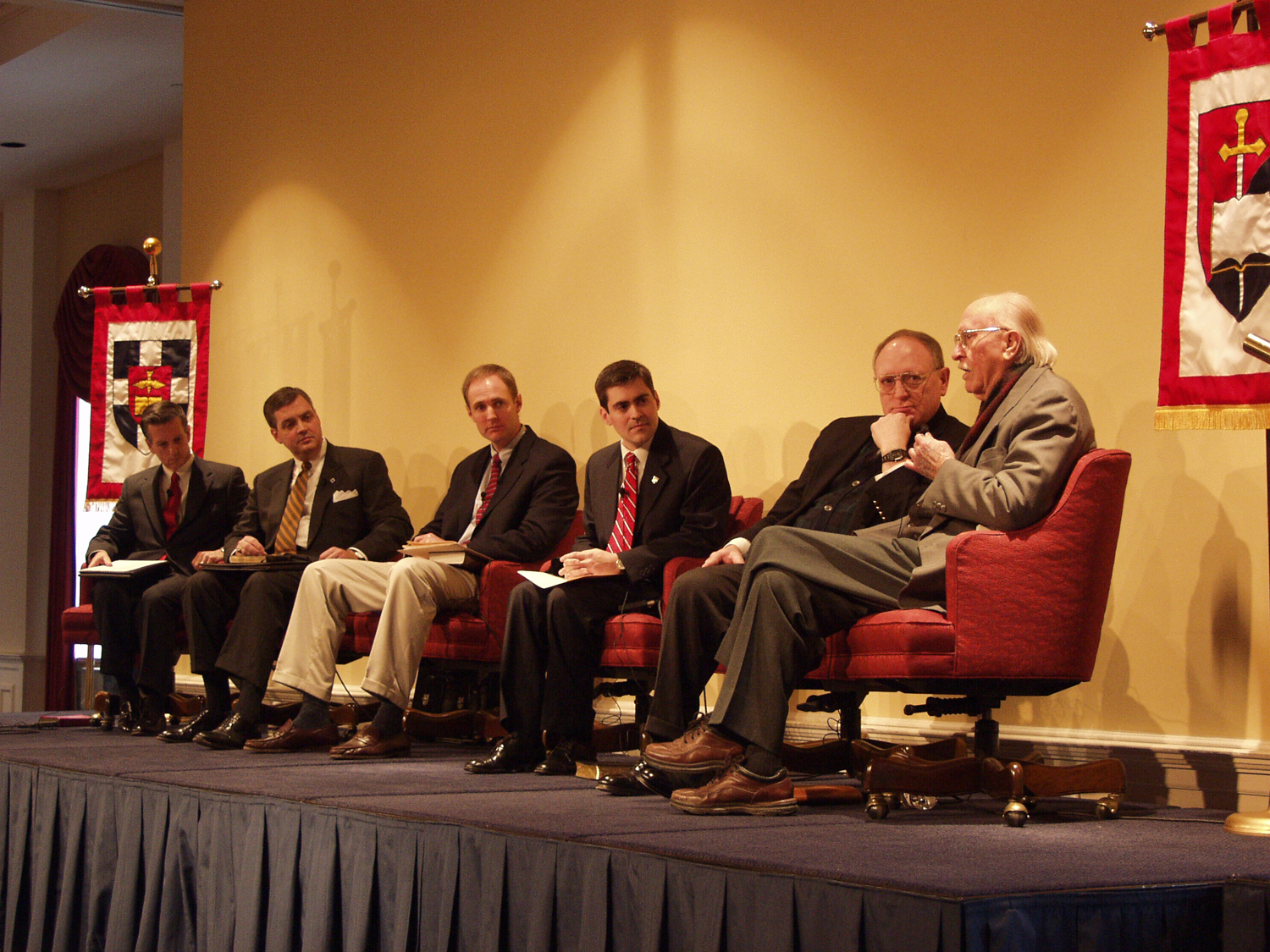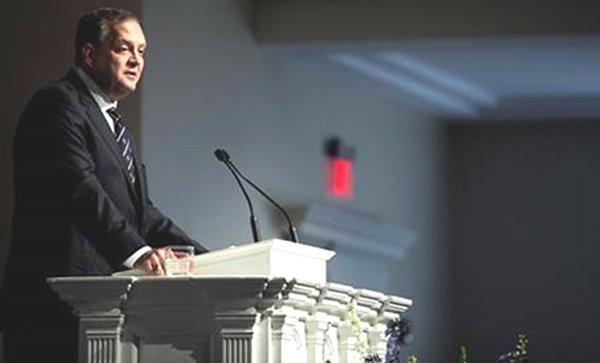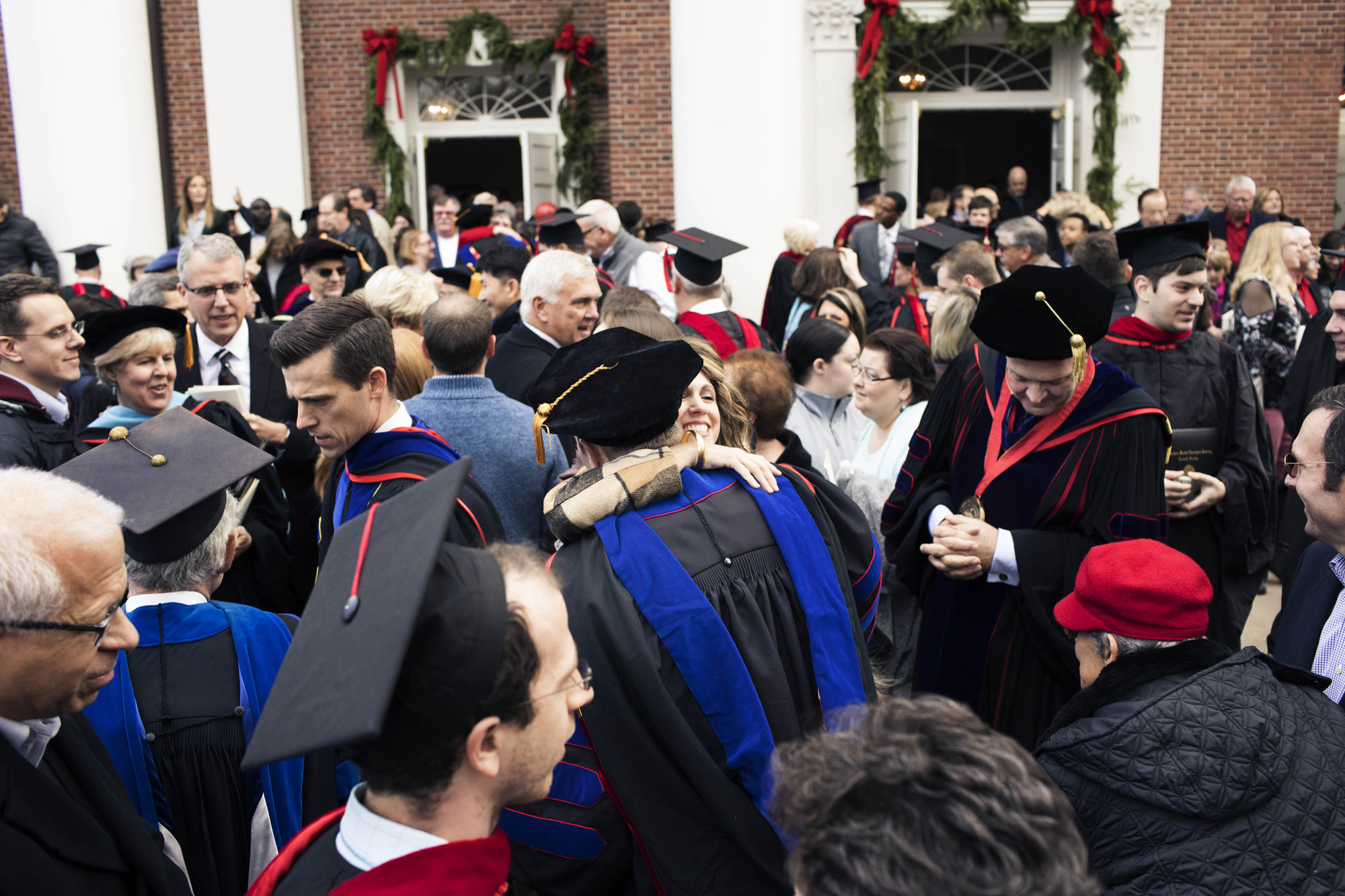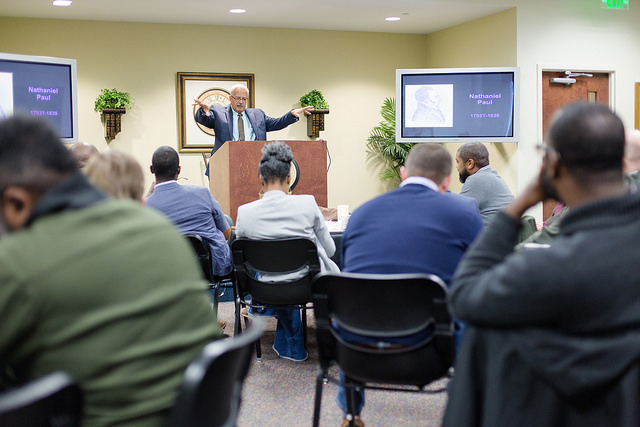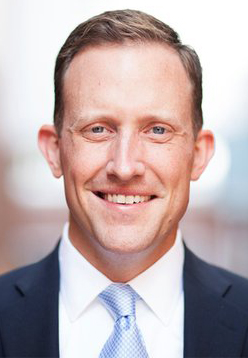
LOUISVILLE, Ky. (BP)–A diverse group of theologians, pastors and professors gathered at Southern Baptist Theological Seminary Feb. 6 to tackle one question:
Should the United States be involved in military action overseas against terrorism?
The 80-minute panel discussion debate found former Southern ethics professor Henlee Barnette siding with seminary President R. Albert Mohler Jr. and two other panelists in support of the U.S. military operation. Joe Phelps, pastor of Highland Baptist Church in Louisville, stood alone in opposition to military action.
The event, titled “Onward Christian Soldiers? Christian Witness in a Time of Terror,” was sponsored by the seminary’s Carl F.H. Henry Institute for Evangelical Engagement, drawing an estimated audience of 550, most of whom were Southern students.
The two other panelists were Mark Coppenger, pastor of Evanston (Ill.) Baptist Church and former president of Midwestern Baptist Theological Seminary, and Kenneth Magnuson, assistant professor of Christian ethics at Southern. Russell Moore, instructor of theology at Southern, served as moderator.
Barnette began by noting that while he opposed the Vietnam War — and even had sons on opposite sides of the issue — he supports the war on terrorism.
“There was a great deal of protest to us being in Vietnam,” he said. “I was opposed to the war. I wrote articles against it. I lectured against it.
“We were not fighting a defensive war in Vietnam,” he said. “Now we are. It is an entirely new kind of war.”
Phelps, though, said the United States did not exhaust its non-military options before it began military action. However, he drew a line between a nation fighting a war and an individual taking physical action, saying that there are some instances where force is needed. Phelps said he affirms the actions of the passengers on the plane that crashed in Pennsylvania.
“I would like to think that our country is doing what it’s doing with the very best of intentions — just as those people on the plane were,” he said. “But the people on the plane had no other alternative — at least that I can think of. … We, on the other hand, do have alternatives to bombing and doing the things that we have done, which in my opinion have increased the danger that our country faces.
“Perhaps we’ve done what we’ve done with the best of intentions. I don’t think it has yielded the results that we hoped it would.”
Referring to Romans 13, Mohler said the United States has been justified in its military response.
“In both the Old and New Testaments, the demands of justice require that those who do evil be punished for those acts of evil,” he said. “War is one of the means by which peace is re-established.”
Barnette agreed, saying that the Greek word for “love” — agape — demands justice.
“You can’t have agape [love] without justice,” he said. “Otherwise it is purely sentimentality. I go along with Augustine on this. You may hit me on the right cheek, [and] I’ll turn the left. But you hit one of my family [members], and you’re going to get justice.”
The panel discussed a wide range of issues, including:
Augustine’s “Just War Theory.”
Magnuson summarized the theory, saying that it involves such goals as limiting civilian casualties and restoring justice.
“It’s important to remember that the Just War criteria have developed as a way of limiting how we might go to war — not as a way of coming up with reasons for going to war,” Magnuson said.
Phelps said he would prefer a peacemaking initiative to a Just War Theory.
“Rather than justifying war — using the Just War Theory to legitimate a war — the biblical initiative is to talk about a just peacemaking theory,” he said. “[We need] to begin to take seriously the principles of Jesus Christ — to enact transforming initiatives on behalf of our country in the global arena.”
Mohler said the bombing of Dresden in World War II violated the Just War Theory.
“World War II was entered as a just war, but it was not always prosecuted as a just war,” he said.
Coppenger agreed, saying that the dropping of the atomic bomb on Hiroshima rather than on an unpopulated area also was wrong.
Coppenger also said he believes a Christian could conscientiously refuse to serve in a war.
“I would opt out of certain wars,” said Coppenger, a recently retired colonel in the U.S. Army Reserves. “I think a Christian soldier could conceivably say, ‘I’m just not going to do that.'”
The killing of innocent people.
All of the panelists said that everything must be done to avoid civilian casualties.
“That’s the morally proper thing to do,” Magnuson said. “Practically speaking, if we go over there and indiscriminately attack [civilians] and seek to teach a lesson, we’ll have very little chance of maintaining any credibility around the world — let alone the Middle East.”
Mohler noted that the United States has already acknowledged killing innocent people but has made every effort to avoid civilian casualties. Further, he said that the U.S. military has been unusually forthcoming as a combatant power.
“Today the United States is tacitly admitting to killing some of the wrong people in the wrong place, and it is letting go prisoners that have been charged of being Taliban that now apparently are not,” Mohler said. “If America is an imperial power, this a first thing. You can’t imagine Caesar sending out a press release saying, ‘We killed the wrong people.’
“Those were human lives. You would write it down in human history as collateral damage, but that’s not an acceptable moral category.”
The killing of innocent people, Mohler said, is what makes war so complex.
“Our government has sought to reduce civilian casualties with technology and other strategic means,” he said. “But no one is wearing white in this with no blood — innocent or otherwise. That is what makes this so difficult.”
Nevertheless, Mohler insisted that Christians must reject any notion of a moral equivalence between the terrorists and the U.S. military action.
The use of the word “evil” in reference to terrorists.
Mohler said use of the term is “inescapable.” He compared the evil that exists today to the evil that existed in Nazi Germany.
“There was a clear understanding that this was an evil that could be removed,” he said. “I think that is a direct parallel to where we are right now. The attacks were intensely militaristic, terroristic.”
Mohler added that little will appease the terrorists — other than the eradication of America.
“The dissatisfaction that turned into hatred that turned into terrorism on the part of these people is not going to be rectified by anything the United States can do other than cease to exist,” he said.
Phelps said that while he believes the word “evil” can be used, it should not simply be limited to terrorist organizations.
“We can say that this is unjustified — that [it] is absolutely an evil and wrong act on the part of the terrorists,” he said. “But having done so, it seems like we shut down our witness and we shut down our ability to make peace if all we do in response to that is vengeance or retaliation.”
The struggle for peace.
Phelps argued that World Wars I and II did not result “in a stable peace in our world,” and that America needs to ask, “[W]hat can we do as a nation to initiate peace around the world?”
Coppenger, though, said that a long sustainable peace is not always possible.
“Given the nature of humans, you cannot sustain the peace indefinitely,” he said. “There is just so much wickedness and depravity and selfishness out there. You can’t say, ‘Well, we fought World War II, and things became unraveled later on.’
“No, you give it your best in your generation to secure peace and to defend the innocent and to right wrongs. But human nature will catch up with you, and you’ll have to do it all over again until the Lord comes.”
The importance of prayer.
“Pray for our leaders — that they will act justly,” Magnuson said. “We should not underestimate the power of prayer. Everyone now should be praying for our government officials — that they will make the right decisions.”
Phelps agreed, adding that Christians also should pray “for our enemies. We have to ask the question, ‘Have we prayed for Osama bin Laden?’ As absurd as that sounds, have we prayed for our enemies?”
–30–
(BP) photos posted in the BP Photo Library at https://www.bpnews.net. Photo titles: PANEL PONDERS WAR and ETHICS OF WAR.
